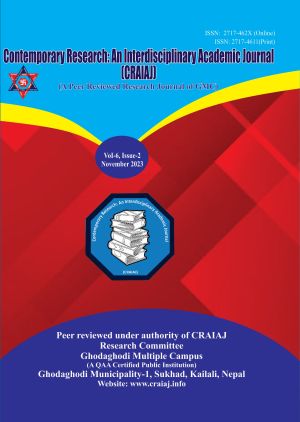Voice of Emancipation from Caste Discrimination: Reading Untouchability and Injustice in Dulal’s Gahugoro Africā
DOI:
https://doi.org/10.3126/craiaj.v6i2.60276Keywords:
Caste discrimination, Cultural shackles, Dalit, Emancipation, UntouchableAbstract
This paper attempts to analyze the issues on the untouchability, injustice and voice declaration of emancipation from caste discrimination in Bishowbhakta Dulal’s Gahugoro Africa. Dalits as Africans are primarily artisans and utilize their skills and perform the imposed duties. However, they get fewer wage and they are hated, humiliated, discriminated, exploited and traumatized in the society by the upper caste people and the nation even in the twenty-first century. Therefore, the purpose of this paper was to analyze the voice of emancipation from various evil cultural practices like caste discrimination, untouchability and injustice. The text was chosen purposively and the research was conducted using a library-based qualitative approach, utilizing relevant texts and sources to analyze the objective. The researcher has implemented cultural studies perspective and the discursive approach of Stuart Hall as main and other theorists’ ideas as supporting tools for theoretical parameters. The data were collected by text information, description and record keeping. The researcher examined that Dalits have been considered untouchable, distanced and humiliated despite their vital role in the society. The imposed professions that were assigned to them could not suffice their needs. Dalits have presented themselves everywhere still they have been the victims of socio-cultural biasness and injustice. So the speaker strictly declares emancipation from every type of cultural shackles. Freedom from such evil practice is inevitable for Dalits in Nepal. So, it is the representative voice of Dalits (Kami, Damai, Sarki, Badi, Gaine, Mushahar and Cyame) in general. The research is significant due to its focus on the inhuman treatment and miserable existence of Dalits in the context of Nepal. The exploration on the voice of emancipation from the caste discrimination in the diverse cultures and cultural practices is valuable to academia.
Downloads
Downloads
Published
How to Cite
Issue
Section
License
Copyright (c) 2023 Ghodaghodi Multiple Campus, CRAIAJ

This work is licensed under a Creative Commons Attribution-NonCommercial-NoDerivatives 4.0 International License.
© Ghodaghodi Multiple Campus, Research Committee, RMC

This work is licensed under a Creative Commons Attribution-NonCommercial-NoDerivatives 4.0 International License. This license enables reusers to copy and distribute the material in any medium or format in unadapted form only, for noncommercial purposes only, and only so long as attribution is given to the creator.




